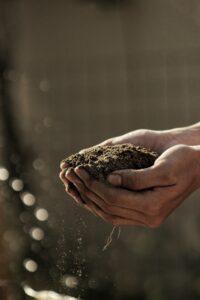 Good soil is the first step to a great garden. Amending your soil is important, to provide a proper environment for plant root growth. Soil amendments can improve many soil characteristics, such as drainage, structure, and water permeability. For a soil amendment to work efficiently, it must be mixed well with your native soil.
Good soil is the first step to a great garden. Amending your soil is important, to provide a proper environment for plant root growth. Soil amendments can improve many soil characteristics, such as drainage, structure, and water permeability. For a soil amendment to work efficiently, it must be mixed well with your native soil.
There are two categories of soil amendments. Organic amendments are made up of things that were once living, such as wood chips, sphagnum peat, or compost, and inorganic amendments are either mined or man-made, such as perlite, pea gravel, and sand. Not all these amendments are recommended for all situations, for example sand added to clay soil creates a texture much like that of concrete. Organic amendments improve soil over time, and many contain nutrients.
An ideal soil contains about 4-5% organic matter. When this level is reached there is little to no need for additional fertilizers. Be aware that many manure or biosolid based amendments may be high in salts, so they should be applied lightly. If you are going to use wood products as a soil amendment, they should be composted first. If not, they will be slow to breakdown, they interfere with water movement, and they cause nitrogen in the soil to be less available to plants. Sphagnum peat moss is a good organic soil amendment, especially for lowering soil pH. Colorado mountain peat however is not as good, it has a higher pH and a very fine texture.
Biosolids are sewage treatment byproducts. They should be used with caution because they have high heavy metal and salt contents. Fresh manure has high ammonia levels, so only aged or composted manure should be used in the garden. Salt concentrations build up as aged manure decomposes, and it also often contains viable weed seeds. Due to E. coli concerns, manure should be applied at least four months prior to harvest in a food garden. Make sure to always wash your home grown produce well. An active decomposition process is required to kill weed seeds and stabilize organic matter in manure.
Compost is decomposed organic matter. This term is not regulated, and many products labeled as compost have not been through a proper decomposition process. Composts come in many varieties, and may contain things like plant materials, biosolids, and agricultural products. Plant based products are preferred due to their lower salt content, but they are often more expensive.
Soil texture often needs amended. Sandy soils have large particles and feel gritty, and clay soils have small particles and sticks together. Loam soils have a mix of particles and are ideal. Sandy soils need to be amended to increase its ability to hold water and nutrients. This can be achieved with composts or peat. Clay soils benefit from improved drainage. For this use fibrous materials such as straw or wood chips.
So, before you get your garden started, tend to your soil. It will help you to have healthier plants and larger yields in food gardens.


